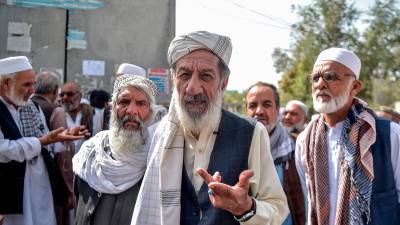KABUL: The Taliban government has announced it will resume pension payments for Afghanistan’s nearly 150,000 retired military and civil servants after a four-year suspension.
They will be the last public sector workers to receive any payments, after the cash-strapped authorities announced an end to the public pension scheme last year.
“When you’re jobless sitting at home and have nothing, you’re worried about food,“ said 71-year-old Abdul Sabir outside the pension department in the capital Kabul.
He was among those scheduled to receive his pension again in a gradual rollout across government institutions.
Retired public sector employees have for the past few years increasingly demonstrated outside government buildings, demanding payments that ended after the return of Taliban authorities in 2021.
“All the pending amounts will be distributed to the retirees,“ pension fund director Mohammad Rahmani told AFP this week.
Government spokesman Hamdullah Fitrat told local media eventually the years of unpaid pensions would be disbursed.
The Taliban authorities have slashed salaries, which are paid erratically, while replacing many civil servants with loyalists.
They do not publish budgets and their revenue streams are opaque.
Observers say security spending has consumed much of the budget at other ministries’ expense, while slashed foreign aid that previously bolstered the public sector has made pension payments unsustainable.
Most people AFP spoke to expected to receive 40,000-50,000 Afghanis ($580-720) a year from their pension, a relatively small sum that entire families nonetheless will rely on for survival.
Abdul Wasse Kargar said he was currently owed 31,000 Afghanis in debt to friends and shopkeepers, after a 45-year career at the education ministry.
“If they give us our pension, it will solve 50 percent of our problems. We can make ends meet with that and we will be free of some of this poverty and helplessness,“ said the 74-year-old, tired of going door-to-door begging for loans.
Nearly half of the Afghan population lives in poverty and the unemployment rate is more than 13 percent, according to the World Bank.
Shah Rasool Omari had tried to get a job during the four years waiting for his pension but said his age dogged his chances.
Potential employers told him that they “want a young boy who can work and who we can order around”.
“I have six sons and then their children, all of them need to be supported from my pension payment,“ said Rasool, who worked in the Air Force for 30 years.
Public sector pensions support around 150,000 families, or almost a million people, the Afghanistan Analysts Network (AAN) said in a 2024 report.
The system had been in crisis long before the Taliban takeover, and the economic crunch that followed the disappearance of foreign aid that funded the pension system sounded the death knell, the AAN report said.
“There was simply not enough domestic revenue coming in for the government to both run the country and meet its obligation to retirees,“ it said.
Nabiullah Attai now regrets his career with the police.
“I gave 38 years — the best years of my life — to this country,“ he told AFP.
“But today, I have nothing to show for it.” – AFP
